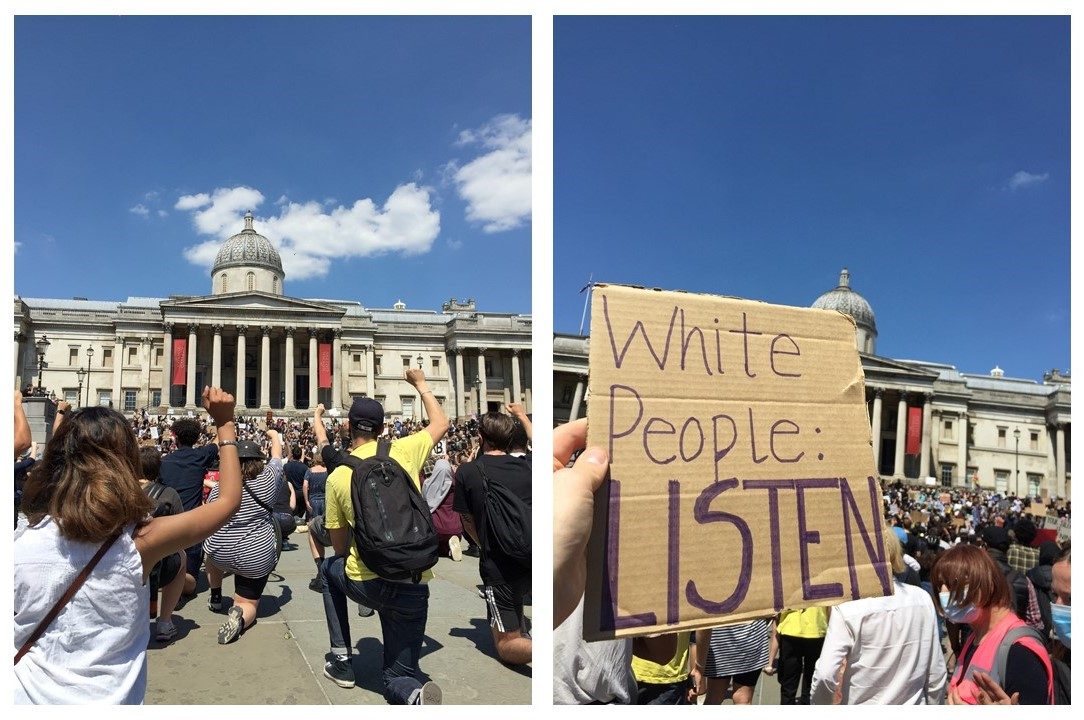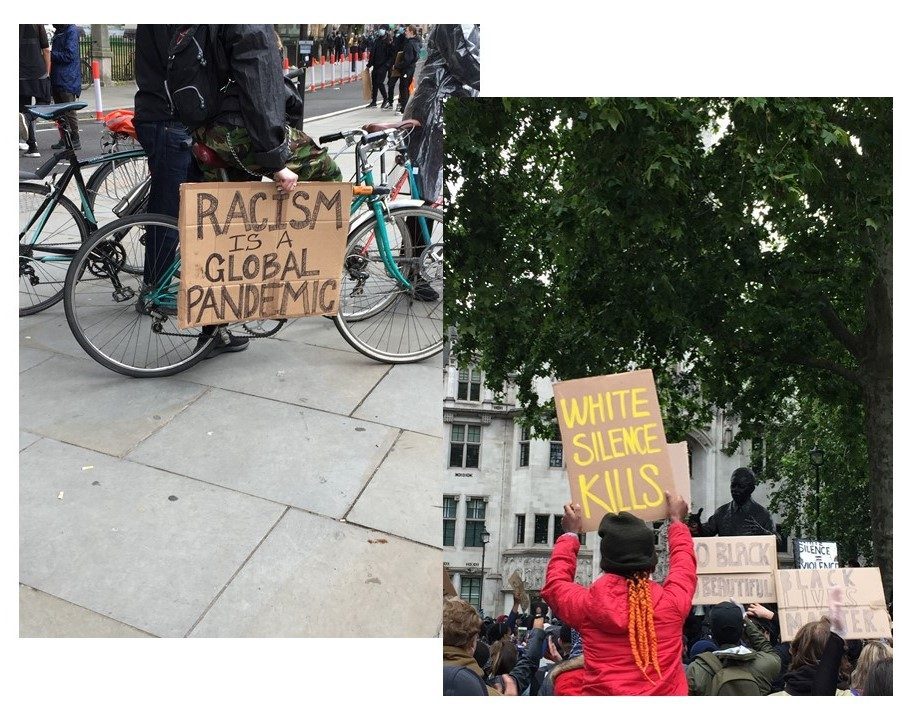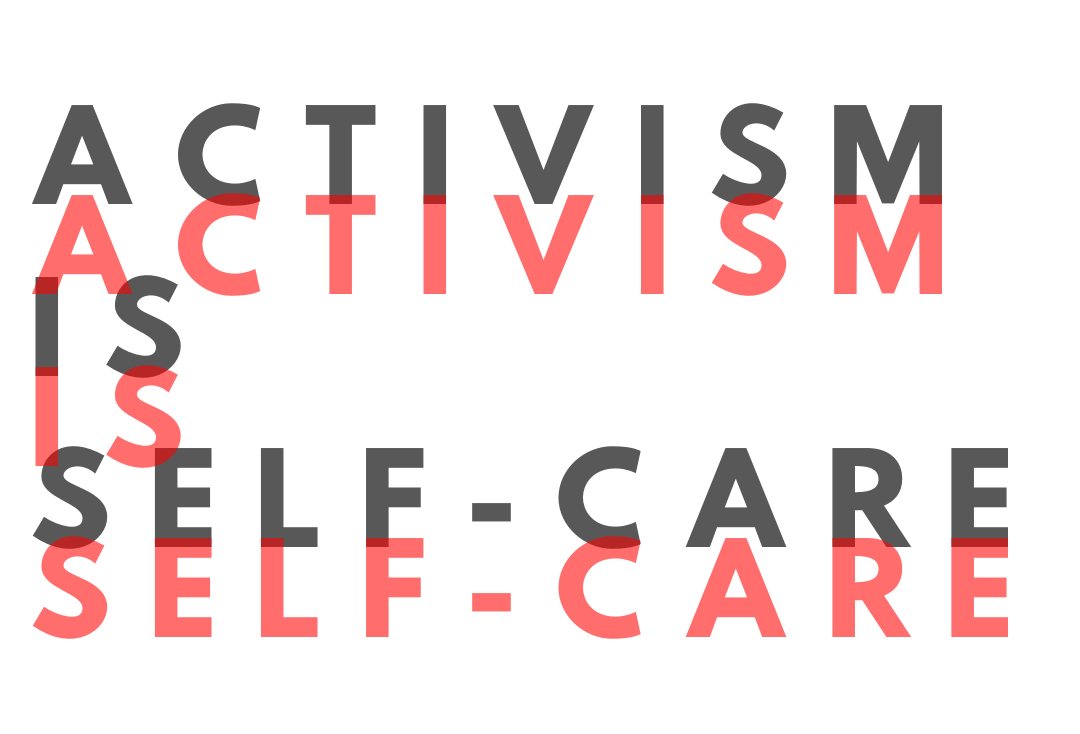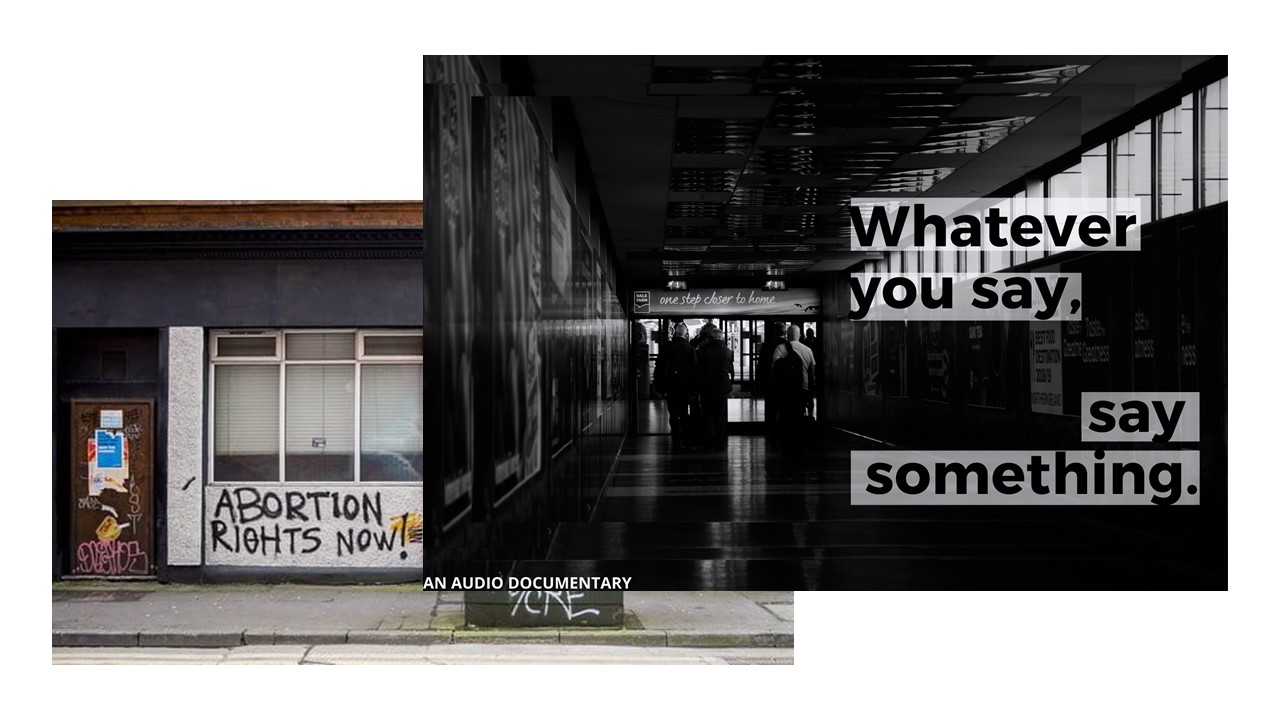It has been over a month since George Floyd was killed in police custody in Minnesota, reinvigorating the Black Lives Matter movement internationally. Here in the UK, anti-racists have been doing the work: despite the threat of coronavirus, demonstrations have been taking place since 3 June; slave trader statues have been toppled; streaming platforms have pulled racist episodes; MPs have been inundated with letters from their constituents; and Reni Eddo-Lodge became the first black British woman to top Amazon UK’s non-fiction bestseller chart with her book Why I’m No Longer Talking to White People About Race.
And yet, many are still asking why protests are taking place over here when George Floyd was killed in the US. I caught up with a couple of anti-racist protesters who have been demonstrating in London since early June to talk about their experiences, what they have learned, and their hopes for what this movement might bring.
Initials have been used to protect the identity of the protesters.
How did you find out about the killing of George Floyd and what was your reaction to the news?
B: I saw it on someone’s Instagram post, so I did a bit of googling and found out what happened. When I found out how he was killed I felt a real anger within. Anger that the American police are so brutal and anger that this brutality is specifically aimed towards black people. I didn’t think his killing would lead to such a big uprising against racism.
C: Twitter, I remember waking up and seeing his name trending. Immediately I thought another black man dead, let’s hope they don’t just sweep this under the rug. Thankfully they didn’t! He changed the world.
When did you join the protests in London and what have they been like so far?
B: We joined for the first major protest starting at Trafalgar Square and then marching around London. They really have been incredible, people from all over have come together. One of the most moving experiences was when hundreds of us knelt in silence outside the Home Office for eight minutes. We were faced by a wall of police officers. I really hope the silence made them think. As a white person it really challenges you because the lived experiences of the thousands of black protesters is so real. You can feel the pain in the atmosphere and it makes you think that change really is needed. But there’s also hope too. With so many people there you feel like we’re on the edge of something.
C: We got to Trafalgar Square maybe 30 mins late, I wasn’t expecting so many people. To be honest I’m a black woman so to see so many white peoples took me aback. It made me beyond happy to see white people standing in solidarity with black people. Every protest I’ve been to has been peaceful, take the media with a pinch of salt. They love to make you think it’s all riots and anger towards the police but it’s really not. I’ve been to a few and none of them have I witnessed any brutality or anger towards the police. Protestors have respected the police even when it’s obvious the police have an agenda to wind protestors up but it’s clear to protestors this is about it being a peaceful protest and we will not go away from that.
Have you been able to maintain social distancing while protesting?
B: At Trafalgar Square we were social distancing and it seemed as if lots people were trying to do the same. Some people were going around giving non-masked people free masks. On the march we were also mindful of social distancing, and there did seem to be quite a few gaps between people. At the other protests people are mindful, but it isn’t always possible.
C: Mostly, I think it’s important to recognise leaving your house in general during this pandemic is a risk in itself. People are queuing for Sainsbury’s and when they get in there, no social distancing is happening at all and the parks in London are full of people not social distancing, so people need to stop acting as if BLM are the only people not social distancing. So yes we may have tried our best to maintain social distancing but it’s not always perfect. It’s imperative you wear a mask and gloves, if you have that then you’re good to go.
How have the media and police been behaving towards protesters?
B: The police have been really difficult at the protests. They create tension by marching into the crowds at speed for no reason or sending nine riot vans with sirens down the road at full speed when we’re literally just marching peacefully. The incident with the horses was because of the police’s overzealous and hyper reactionary responses. They even kettled a group until 2am. There’s a fascinating feed on Twitter about what happened with that…. It was atrocious.
I thought about how when we went on an anti-Brexit march there were literally no police officers to be seen and there were certainly now riot vans, yet there were way more people at the anti-brexit marches. It just shows how they held us in way more suspicion. I guess they just didn’t like the fact that part of the protest was against institutional racism within the British police force.
The media has framed BLM as violent and focused on the minority that acted out. If we look at the incident with the horse, that was at 9pm. The protest started at 1pm. So that’s like eight hours of peaceful protest, yet all the reporting was about that final hour. The media also present the police as these amazing saviours, which they really are not. Not one media outlet spoke about the illegal kittling for instance. It’s also angered me that the media are saying this is just about America. It’s not. That attitude is part of the reason that these protests are so necessary.
C: What the media doesn’t show you is the police intimidation. They make protestors feel incredibly uneasy. We are literally fighting against brutality that’s mostly caused by the police, but they still brutalise us with their presence
Do you have any advice for people who want to join the protests?
B: Familiarise yourself with your rights before going – especially if you’re black as you’re more likely to be subject to police brutality and more likely to be stopped and searched than white activists. GOWISELY is an acronym for your stop and search rights, google it to find out. Also look at Green and Black Cross site which explains your rights in detail. Write a number of someone you can contact or the Green and Black protest helpline in permanent marker on your arm so that if you do get arrested you know who to contact.
Take water, food and sun cream with you especially as the sun gets stronger. You need to look after yourself there.
Take a placard too.
C: Be mindful of the lives of others. If you have COVID-19 symptoms, then stay at home and follow the protests through twitter. There will be other protests you can go to when you don’t have symptoms, there are other ways you can support the cause. If you don’t have symptoms then make sure you wear a mask at all times, gloves if you are holding a sign and lots of water and snacks
What do you hope the outcome of the protests will be?
B: I want the protest to lead to personal changes in people and then national/global change. For individuals, I want white people to wake up to their privilege and to question their own racial prejudices. I want white employers to see the protests and think, oh crap, I’ve actually mistreated my black employees. I want white teachers to say, oh yeah, I tell off the black kids in my class all the time when they’ve not even done anything. I want white doctors, midwives and nurses to be like, oh yeah, I don’t actually listen to my black patients and I don’t give them the medication they need. I basically want white people to get educated, to think about how they contribute to the oppression of black people and to change their behaviour and mindset as a result.
On the national/global level, I want to see real changes in government attitudes, approaches to policing, what is taught in schools, how the media portrays black people (eg black boys are often referred to in reports as ‘men’, whilst young white men are often referred to as ‘boys’).
Already there has been huge pressure on education ministers to diversify the curriculum and to teach children about institutional racism and unconscious bias. There has also been a review ordered by the government. These are good steps, but government apologies and radical transformation is needed.
C: I’m very pessimistic when it comes to being hopeful especially when it comes to change for black people. Personally, for me I have seen change but I’m not going to allow myself to get excited for change until I feel it in 5/10/20 years. We are fighting against 400+ years of systematic, institutional racism. It’s not going to change overnight. People can post black squares and next year won’t even remember it happened. For black people it goes deeper it’s our everyday reality. We have hoped for change since day 1, our parents hoped for change for us and still we are being killed. My only hope is that in 20 years if I’m blessed with children that this won’t be their reality. But then again, my mum hoped that for me and look where we are.
What can people do to help?
B: Stop sharing posts online that focus on the violence at the protests. If black lives really do matter to you then you shouldn’t be doing this. It undermines the struggle that has led countless black people to risk their lives, it undermines everything this movement is fighting for and it supports the narrative that BLM is violent and thuggish (which it is absolutely not). The same goes for snooty comments and posts about lack of social distancing. Also, help by joining in and if no protests are in your area, start one yourself.






